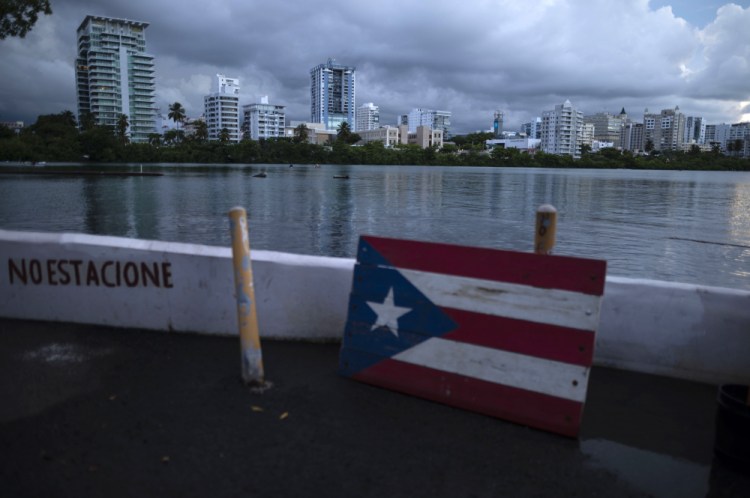WASHINGTON — The Supreme Court hears oral arguments Tuesday about how Congress denies residents of Puerto Rico certain Social Security benefits, in a case that could shift the unusual and contentious relationship between Congress and the island territory the U.S. acquired more than a century ago.
The case centers on one man with severe health problems, Jose Luis Vaello-Madero, who moved from New York to Puerto Rico in 2013 and thereby lost eligibility for the benefits. A provision from a 1972 law provides Supplemental Security Income for aged, blind and disabled individuals, but not in Puerto Rico and most other U.S. territories.
A decision that requires the United States to include Vaello-Madero and other Puerto Rico residents in the program could cost an additional $23 billion over the next decade, and affect other laws that treat Puerto Rico and other territories differently than the 50 states. A ruling is expected by the end of the term in late June.
Vaello-Madero’s attorneys say the provision is unconstitutional because the benefits from a national welfare law go to disabled Americans in the 50 states, but not to the disabled Americans in Puerto Rico, which as a non-state has no voting power in Congress to change try to change it.
The justices have heard from Vaello-Madero’s attorneys that the disparate treatment stems from a “quagmire of racial and ethnic discrimination,” and the court’s review of this law would counter how Congress “continues to hold Puerto Rico in an open-ended state of political powerlessness.”
“In fact, Congress’s decision to exclude Puerto Rico from SSI solely on the premise that it is ‘outside the United States’ can be traced directly to a historical desire to single out the people of Puerto Rico for lesser treatment because of their mixed race and Hispanic ancestry,” Vaello-Madero’s attorneys wrote in a brief in the case.
Lawyers for the federal government told the justices that Vaello-Madero’s situation forcefully illustrates the need to enhance aid to needy individuals in Puerto Rico and that President Joe Biden supports a policy to extend SSI benefits there — but also that it’s not the court’s role to look at whether Congress’ actions are related to a legitimate government interest.
“The proper mechanism to effectuate such a change in social welfare policy is action by Congress — not a ruling by this Court overruling its precedents and invalidating an Act of Congress under rational-basis review,” the Justice Department wrote in a brief.
The treatment of Puerto Rico has sparked a flurry of legislation about the territory and some hearings this Congress, including bills to address SSI benefits. They have not gotten much traction.
Lower courts in the case ruled that the provision violated the equal protection part of the Fifth Amendment’s protections for due process.
And a federal appeals court rejected the government’s arguments that Congress could justify exclusion of Puerto Rico for three reasons: that residents there don’t pay federal income tax, that the cost would be high and that it would disrupt Puerto Rico’s economy.
In part, the United States will argue that the Constitution gives Congress broad power to treat territories differently than states.
Factors include the relationship between the territory and the United States, how much fiscal and governmental autonomy the territory has, economic and social conditions, political ties to the United States and whether the territory may move toward statehood or independence over time.
“Courts have neither the constitutional authority nor the institutional competence to review Congress’s weighing of those intensely political considerations,” the Justice Department told the justices in a brief.
Congress provides federal assistance in Puerto Rico through a different program — Aid to the Aged, Blind, and Disabled — that provides more local control but less federal funding, and covers fewer people with a lower level of benefits.
A year ago, when the Trump administration asked the Supreme Court to take the case, the Justice Department argued that a ruling against the provision “could affect numerous other Acts of Congress that treat Puerto Rico differently than the States and the District of Columbia for purposes of federal benefits programs.”
That includes parts of Medicare, Medicaid, a school lunch program, a pandemic relief fund, temporary assistance for needy families and child welfare services.
The Biden administration added that a decision that overrules two precedents in this area could call into question laws that treat territories more favorably than the states — for instance, the laws exempting Puerto Rico from most federal taxes.
Send questions/comments to the editors.



Success. Please wait for the page to reload. If the page does not reload within 5 seconds, please refresh the page.
Enter your email and password to access comments.
Hi, to comment on stories you must . This profile is in addition to your subscription and website login.
Already have a commenting profile? .
Invalid username/password.
Please check your email to confirm and complete your registration.
Only subscribers are eligible to post comments. Please subscribe or login first for digital access. Here’s why.
Use the form below to reset your password. When you've submitted your account email, we will send an email with a reset code.